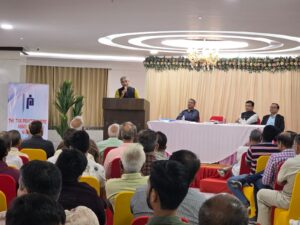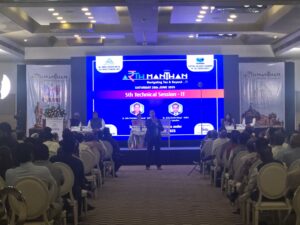GST WEEKLY UPDATE : 11/2023-24 (11.06.2023) By Vipul Khandhar

-By CA Vipul Khandhar
E-Invoice Verifier APP By GSTN – Advisory:
- The E-Invoice Verifier App developed by GSTN, has been introduced which offers a convenient solution for verifying e-Invoices and other related details. GSTN understands the importance of efficient and accurate e-invoice verification, and this app aims to simplify the process for your convenience.
- E-Invoice Verifier App – Key Features and Benefits:
QR Code Verification: The app allows users to scan the QR code on an e-Invoice and authenticate the embedded value within the code. This helps in identifying the accuracy and authenticity of the e-Invoice.
User-Friendly Interface: The app provides a user-friendly interface with intuitive navigation, making it easy for users to navigate through the app’s features and functionalities.
iii. Comprehensive Coverage: The app supports verification of e-Invoices reported across all six IRPs, ensuring comprehensive coverage and convenience.
Non-Login Based: The app operates on a non-login basis, meaning users are not required to create an account or provide sensitive personal information to access its functionalities. This simplifies the user experience and makes it more convenient for users.
- How to use the e-Invoice Verifier App:
Download the App: Visit the Google Play Store and search for “E-Invoice QR Code Verifier.” Download and install the app on your mobile device free of charge. The iOS version will be available shortly.
QR Code Scanning: Utilise the app to scan the QR codes on your e-Invoices. The app will authenticate the information embedded in the code and one can compare it with information printed on the invoice.
- GSTN emphasizes that the e-Invoice Verifier App does not require any user login or authentication process. Anyone can freely scan QR codes and view the available information.
- For more detailed information please see the FAQs in the app. This comprehensive FAQ document will provide you with additional guidance on using the app and resolving any queries you may have.
- GSTN is dedicated to enhancing your experience with the E-Invoice Verifier App and providing a process of seamless e-Invoice verification. GSTN is also working towards launching Version 2 with the Search IRN functionality, which will further streamline your e-Invoice verification.
- DGFT Announces New Import Guidelines for Watermelon Seeds until October 2023:
(Public Notice No. 13/2023-DGFT | Dated: 8th June, 2023)
- The Directorate General of Foreign Trade (DGFT), under the Ministry of Commerce and Industry, has issued new guidelines regarding the import of watermelon seeds. The new procedures, in effect until October 31, 2023, are specified in the public notice No. 13/2023-DGFT, with the import quota not to exceed 35,000 MTs.
- The DGFT’s decision to put a cap on the import of watermelon seeds aims to ensure market stability and protect local producers. The imported quantities will be allocated based on factors such as an applicant’s past imports, their processing capacity, and overall turnover. A notable aspect of this decision is the weightage system wherein 30% of weightage is given to the average import of watermelon seeds by the applicant(s) in the last three years and 70% weightage is assigned to the applicant’s processing capacity.
- This public notice also stipulates stringent measures to maintain accountability. Mis-declaration of any sort could lead to the applicant’s disqualification from the current allocation and subsequent allocations for the next two years. Furthermore, DGFT retains the right to modify the allocation process as necessary.
- The new import guidelines issued by the DGFT for watermelon seeds represent a balanced approach between fostering market competition and safeguarding the interests of local producers. By setting clear eligibility requirements and maintaining rigorous checks, the DGFT aims to ensure fairness and transparency in the allocation process. The defined quota and weightage system will likely guide the sector towards a stable and predictable future.
- Important AAR & Judgements:
(i) AAR On Supply of goods and services through separate agreements will not be considered as composite supply:
(Applicant – M/s. PES Engineers Pvt Ltd)
In a recent ruling by AAR Telangana in the case of M/s. PES Engineers Pvt. Ltd. [TSAAR Order No. 09/2023 dated April 13, 2023], held that when parties enter into separate agreements for goods and works contract services, they are treated as distinct supplies and not composite supply. Accordingly, if any advance is received for supply of goods, that will be taxed as per Section 12(2)(a) of the Central Goods and Services Tax Act, 2017.
(ii) AAR On Input Tax Credit for Machinery Foundation and Structural Supports:
(Applicant – Colourband Dyestuff P Ltd)
Colourband Dyestuff P Ltd, a dye manufacturing company, has filed an application seeking an advance ruling on the eligibility of input tax credit (ITC) for the works contract services and materials used for the foundation and structural supports of their machinery. The applicant argues that the foundation and supports should be considered as part of the plant and machinery, which qualifies for ITC. The authority has considered the applicant’s submissions, along with relevant provisions of the CGST Act, and examined the photographs and certificate provided. The authority concludes that ITC is not available for works contract services and materials used for the construction of an immovable property, except for plant and machinery. However, the foundation and structural supports are explicitly included in the definition of plant and machinery, making them eligible for ITC. The ruling provides a detailed analysis of each item’s eligibility and clarifies the applicant’s claim. AAR Ruled as follows:-
[a] Works contract services (WCS) taken for structure on which machineries are fixed to earth by foundation and services taken for setting up plant i.e. MS steel structure is eligible subject to findings from para 19 onwards. Input Tax Credit (ITC) on structure/shed, erected on the left side of the Sand mill and spray dryer and the ITC on the structure/shed [i.e. roof and its supports] is not eligible. ITC in respect of foundation and support structure in respect of ETP [Effluent Treatment Plant] and Transformer is blocked in terms of Section 17(5) of the CGST Act, 2017.
[b] Steel [TMT bar] being procured by the applicant company and used while taking works contract services for making the said foundation to fix machineries to earth is eligible subject to findings recorded in para 19 onwards.
(iii) AAR On GST on Old Gold Jewellery purchased & Sold after melting & HSN Code:
(Applicant – White Gold Bullion Private Limited)
The applicant purchasing second hand gold in the form of jewellery / parts of jewellery, from unregistered individuals and selling to registered / unregistered dealers, after melting the same, in the form of lumps / irregular shapes of gold, cannot pay GST on the margin difference between the sale price and purchase price as stipulated in Rule 32(5) of CGST Rules, 2017.
The HSN Code for Old Gold Jewellery is 7113 and after melting into gold lumps or irregular shapes of gold the HSN Code is 7108.
(iv) Hon’ble Gujarat Highcourt Decision Regarding SEZ Unit Not Exempt From Inspection, Investigation Under GST:
In an important development, the Gujarat High Court has ruled that GST officials can initiate proceedings against a unit situated in the Special Economic Zone (SEZ). It has also imposed a penalty on the unit for not cooperating with the process initiated by the tax department.
“Respondent authorities (GST Department) are empowered to carry out proceedings in SEZ,” a division bench of Justices Ashutosh Shastri and J C Doshi said in a recent ruling, while dismissing a petition filed by RHC Global Exports Private Ltd. Further, it said the Tax Department’s jurisdiction is unquestionable as the Central Government has already authorised those officers by virtue of a notification dated August 5, 2016. Further, provision under the State GST law indicates that where any proper officer issues an order under this Act, he is also issuing an order under the CGST Act as authorised by the Act, or under intimation to the jurisdictional officer of the Central Government
Therefore, “it cannot be said that the tax officers were acting without the authority of law or jurisdiction,” the bench added. Further, by virtue of a circular dated July 7, 2017, the functions of proper officers under the CGST Act are also defined. Hence, “once the Central Government has notified the functions of proper officers, the said functions shall also be applicable to be carried out by the officers under the CGST Act and, hence, it cannot be said there was a lack of authority on the part of the respondents, as contended,” the bench said.
After going through all the facts submitted and arguments made, the bench found this an attempt by the petitioners to thwart and delay the legal proceedings initiated by respondent authorities and as such the petitioners’ move appears to be an abuse of the process of law, looking to the manner in which the irregularities are alleged to have been committed. “Such an attempt on the part of petitioners deserves to be dealt with firmly so that litigants do not take advantage of the situation by bringing such kinds of litigation,” the bench warned.
Disclaimer:
This publication contains information for general guidance only. It is not intended to address the circumstances of any particular individual or entity. Although the best of endeavour has been made to provide the provisions in a simpler and accurate form, there is no substitute to detailed research with regard to the specific situation of a particular individual or entity. We do not accept any responsibility for loss incurred by any person for acting or refraining to act as a result of any matter in this publication.
(The Author is a well know Chartered Accountant practicing at Ahmedabad)




